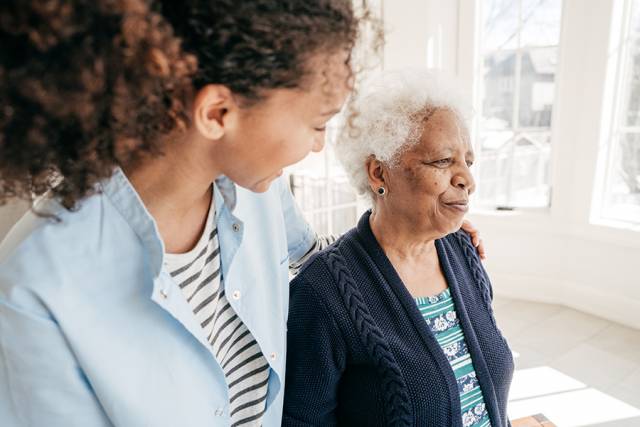You are here
New Report Shows Impact of COVID-19 on Older Adults and Their Caregivers
The COVID-19 public health emergency has profoundly affected older adults and their informal or unpaid caregivers. Throughout this pandemic older adults are not able to visit with loved ones, and they experience challenges getting basic household supplies, food and health care. Their caregivers, such as family or friends, are carrying the stress of supporting the health and well-being of older adults, and managing their own needs.
Recognizing these challenges, the CDC Foundation, with technical assistance from the Centers for Disease Control and Prevention (CDC), funded a study to examine the needs and concerns of community-dwelling older adults and caregivers during COVID-19, and the public health supports available to them.
The report titled “Maintaining Physical and Mental Well-Being of Older Adults and Their Caregivers During Public Health Emergencies,” was conducted by NORC at the University of Chicago, with its partners TMNCorp and Burness.
The report findings show that during COVID-19, older adults reported feeling socially isolated and lonely. They were anxious about contracting the virus and giving it to a loved one. They were concerned about getting household items and the food they wanted. In addition, they also reported needing help with accessing and using technology to get health care.
About half of older adults received help from family, friends, neighbors or programs—most commonly check-ins, delivering groceries or basic supplies, and transportation.
The concerns expressed by caregivers are not new, but they are amplified during COVID-19. Caregivers reported fear and anxiety as they struggled to balance their own physical and mental health needs with those of the loved one in their care. Caregivers wanted respite care for temporary relief.
Fortunately, there are many resources available to help address the needs of older adults and caregivers during COVID-19. The report describes over 300 existing public health supports, including education, direct services, health care programs, and other resources.
The study had a special focus on understanding the experiences of racial and ethnic minorities, individuals with disabilities, rural populations, tribal populations, LGBT individuals, populations with limited English proficiency, and socioeconomically disadvantaged populations.
According to CDC Foundation president and CEO Judy Monroe, MD, “The impact of COVID-19 on older adults and caregivers has been extremely challenging. We hope the findings from this study will promote the physical and mental well-being of older adults and caregivers now and during future public health crises.”
The executive summary, full report, and accompanying materials are now available, including two caregiver resources:
- Caregivers in America during COVID-19: What You Need to Know (English)
- Your Health and Well-being Matter: Help for People Caring for Older Adults (English, Spanish)
We gratefully acknowledge that this project utilizes donor funds from the flexible COVID-19 Response Fund.
The CDC Foundation provided support for this study.

